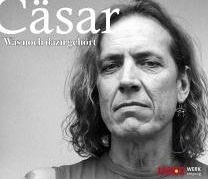Peter ‘Cäsar’ Gläser (1949-2008)
5. 12. 2008 | Rubriky: Articles,Lives
 [by Ken Hunt, London] One of the former German Democratic Republic’s most notable and most famous rock musicians, guitarists and bandleaders Peter ‘Cäsar’ Gläser died in Leipzig on 23 October after a long illness. Gläser was born in Leipzig on 7 January 1949 and came to people’s attention as a member of the Klaus Renft Combo. Having joined them as a founding member in 1967, he was called up soon after to do national service in the army and he rejoined them afterwards in 1969. Peter ‘Cäsar’ Gläser (the nickname says a great deal) might be described as Renft’s shadow. After Renft effectively got banned for social criticism in 1975 (helped along by singing the lyrics of Gerulf Pannach who found himself exiled to the West), Gläser co-founded the splinter band Karussell. In 1976 it was largely seen as the legitimate successor of the Klaus Renft Combo. Gläser finally gave up the Karussell ghost in 1983, worn down by balancing fans’ expectations and trying not to cross the Stasi and state authorities. He became part of the Amiga Blues Band.
[by Ken Hunt, London] One of the former German Democratic Republic’s most notable and most famous rock musicians, guitarists and bandleaders Peter ‘Cäsar’ Gläser died in Leipzig on 23 October after a long illness. Gläser was born in Leipzig on 7 January 1949 and came to people’s attention as a member of the Klaus Renft Combo. Having joined them as a founding member in 1967, he was called up soon after to do national service in the army and he rejoined them afterwards in 1969. Peter ‘Cäsar’ Gläser (the nickname says a great deal) might be described as Renft’s shadow. After Renft effectively got banned for social criticism in 1975 (helped along by singing the lyrics of Gerulf Pannach who found himself exiled to the West), Gläser co-founded the splinter band Karussell. In 1976 it was largely seen as the legitimate successor of the Klaus Renft Combo. Gläser finally gave up the Karussell ghost in 1983, worn down by balancing fans’ expectations and trying not to cross the Stasi and state authorities. He became part of the Amiga Blues Band.
 The “Amiga” part of their name was a nod towards the VEB’s pop, rock and folk record label. Essentially there was no other game in town in the GDR. Either one recorded for Amiga or for nobody; similarly for overseas acts – whether Phil Collins or Billy Bragg, Paul Robeson or Ravi Shankar – Amiga was the only conduit through which their recordings could appear. It should be pointed out that the GDR’s other record labels such as the classical music label Eterna and the literary and spoken word label Litera were merely subsidiaries of the VEB monopoly.
The “Amiga” part of their name was a nod towards the VEB’s pop, rock and folk record label. Essentially there was no other game in town in the GDR. Either one recorded for Amiga or for nobody; similarly for overseas acts – whether Phil Collins or Billy Bragg, Paul Robeson or Ravi Shankar – Amiga was the only conduit through which their recordings could appear. It should be pointed out that the GDR’s other record labels such as the classical music label Eterna and the literary and spoken word label Litera were merely subsidiaries of the VEB monopoly.
Before the political changes – the Wende in German, that earth-shattering period from the autumn of 1989 to the spring of 1990 – Gläser founded his first band with Cäsar in the name, with Cäsars Rockband in 1984. A succession of various line-ups and variant names with the word ‘Cäsar’ in them followed over the years. He also led other combinations with Spieler (Players) in their name and worked with his musician sons. He gave his last concert in December 2007 but in his final performance days he also gave readings from his 2007 autobiography Wer die Rose ehrt (‘Whoever honours the rose’). Fittingly, the title came from one of the Renft-era’s biggest hit songs.